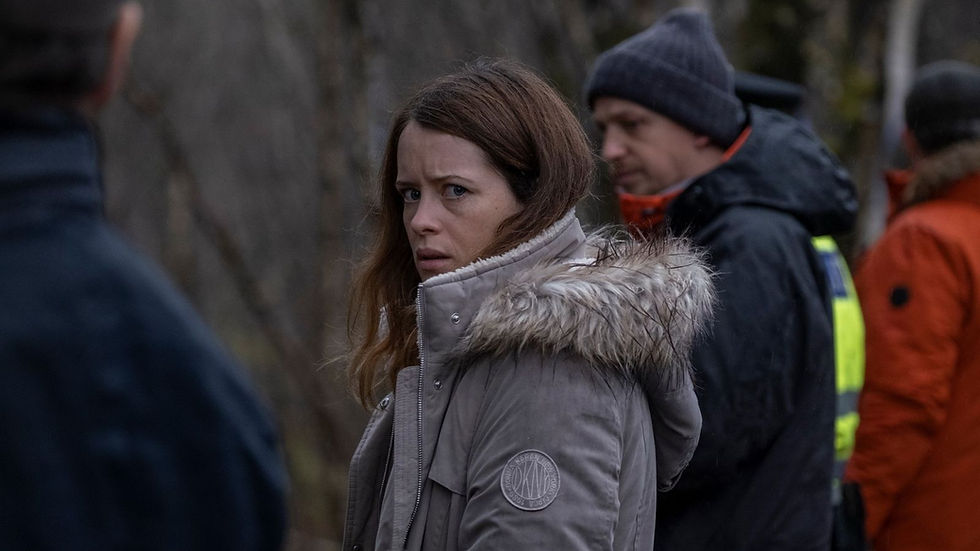James McAvoy vomits and flies on the screen as a father who did not rely on the police and began to search for the missing child himself.
Oil company employee Edmond (James McAvoy) hasn't seen his son for a long time. He preferred work to his family for a long time. During this time, ex-wife Joan (Claire Foy) found herself a responsible man, Frank (Tom Cullen). And the son turned into a primary school student and remembers dad, it seems, only from expensive gifts for birthdays. But something breaks inside the careerist father when he finds out that his child, having gone to a children's camp, is missing. The parent's indifference is replaced by rage and fear. And although the interested and honest Inspector Roy (Gary Lewis) will take the case from the side of the law, Edmond will take the search into his own hands.
The father starts looking. This is not an investigation. There is no question of any deduction. The hero is driven by a parental instinct, which crookedly but surely leads him to the goal. The first to come under the hot hand is Frank, who, to put it mildly, is not very worried about the disappearance of his stepson and from whose submission the child went to the ill-fated camp. As a result of the conversation in the kitchen, Frank goes to the hospital, and Edmond goes to the monkey house, where Inspector Roy reasonably notices that the child could have been abducted, and the reason for the disappearance is his father’s work related to finding oil in “hot spots”. The real reason for the kidnapping will be both more commonplace and more terrible.

Gone is the English-language adaptation of Christian Karion's French film My Son. Moreover, the remake was made by the hands of the same people as the original four years ago: the director, cameraman, editor, composer smoothly migrated to the English version of the production. At first glance, only the setting of the project has changed. James McAvoy replaced Guillaume Canet, autumn Scotland replaced winter France, and a glass of brandy replaced a glass of wine. But the main thing is not the setting, but the fact that the authors finalized the script in an attempt to level the irregularities that emerged in the French version. After watching it, two different films remained in my head: a family drama about the mistakes of the past and a thriller about saving a child from the hands of villains.

History cracked right in the middle of the timing. The English version relies on a thriller and tries to bring both parts into greater intonation balance. To do this, Christian Karion rearranges the accents from the very beginning in such a way as to transfer the viewer's attention to intrigue from the mental lamentations. For example, soon after the start of the investigation, it turns out that the police are powerless, because mysterious people are behind the abduction, who can give orders to the guardians of law and order. Karion is also making ends meet some of the original film's mid-story lines. Now Joan goes to the lair of villains for her son, along with her ex-husband. But the main change has to do with the figure of the hero. From the investigator's inquiries and squabbles with his wife, it becomes clear that, unlike the French prototype, Edmond McAvoy was not just a bad father, he was a real piece of ice. And if in the French version the question of the moral qualities of the parent remained open, then in the new version he is definitely wrong. It is necessary to save the son, otherwise a deep sense of guilt will simply drive the hero crazy.

On set, McAvoy was given complete carte blanche for improvisation. And it's not about the size of the artist. As with the original film, the lead actor never read the script. Karion's concept is that the actor, like his character, must be immersed in the unknown. But if Guillaume Canet before the start of filming really knew the story only in the most general terms and was, of course, confused in places, then McAvoy, it seems, watched the French version and in each scene tries to jump above the head of his colleague. Where Kane just sheds a tear, McAvoy gasps with tears. Where one is indignant, the other is furious. There is a scene where the father watches home videos and cries for five minutes. But all this moisture is justified, it is only a stage on the path from complete confusion to sacred anger. By the end, Edmond's figure will be filled with the plasticity of an animal that frantically rushes about in search of its cub. Moreover, he is not some kind of intelligence officer, as was, for example, Liam Nisson from the "Hostage" trilogy, but a simple man in the street.
Gone Gone is an interesting attempt at talking about parental responsibility based on a thriller, centered not on superheroes, but on ordinary people. This is a story about atonement and how a respectable person discovers a primal rage in himself when it comes to his family. This is, finally, the benefit performance of James McAvoy, one of the most talented actors of our time.
This article was sponsored by Father Bart.
Comments